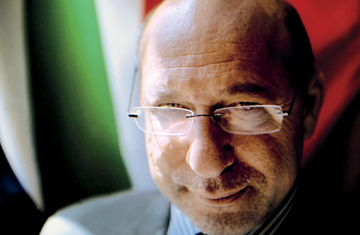
In the uncertain world of stock markets, there are a few events so unambiguously frightening that they guarantee an instant crash. One is a terrorist attack on the world's biggest economy. Another is a global banking collapse. South Africa has a third trigger: the departure of Finance Minister Trevor Manuel. When Manuel, 53, resigned on Sept. 23 last year, the Johannesburg Stock Exchange fell 4% in minutes. Actually, Manuel wasn't going anywhere. President Thabo Mbeki had been ousted in an internal party coup a few days earlier and protocol demanded Manuel step down before being reappointed by Mbeki's successor. When that was explained, the markets recovered quickly.
The incident illustrates the dilemma the best public servants face. The better they do their job, the longer they have to do it. After 13 years running Africa's biggest economy, Manuel actually would quite like to do something else. "You bet I would!" he tells TIME. But any plans are on hold for now. In the middle of the global slump, he knows he's needed more than ever. "There is a silly part of me that sees this appointment as a service to the people," he says. (See pictures of the global financial crisis.)
It's not only South Africans who look to him to bring order to their world. Since his appointment way back in 1996, Manuel has steered his country from near bankruptcy to steady growth. There's a long way to go. Around one-third of South Africans still live on $2 a day or less. At the same time, Manuel has also helped transform how the rich world views the poor one. Globalization has given new status to places like Brazil, China, India, Russia and South Africa, but the institutions that manage the global economy — the U.N., the World Bank, the International Monetary Fund — still reflect the world as it was at the end of World War II. Manuel was one of the first to point this out and has consistently championed the view, now widely accepted, that the global order needs a fundamental overhaul. (See pictures of the Top 10 scared traders.)
The current crisis gives those arguments new urgency. The downturn has demonstrated how unevenly power is distributed, and how bad that is for all of us. At the World Economic Forum in Davos in January, Manuel warned that billion-dollar bailouts were a distraction from a bigger, supranational task: the creation of truly global regulation to oversee global capitalism. Or as he recently put it to Johannesburg weekly the Financial Mail: "If you were a doctor and your patient had major cardiovascular and lung problems, prescribing an aspirin ... might make him feel better, but would it solve the problem?" At the G-20, the developing world will look to Manuel to speak for them, as he often does. The humbled leaders of rich nations are likely to listen. "There's not a single finance minister in the rich world today that will not take a call from Trevor Manuel," says Pippa Green, author of the Manuel biography Choice, Not Fate.
Manuel knows what it takes to bring the powerful round to his point of view. He grew up poor in Cape Town. Under the apartheid racial-classification system, he was considered "colored," or mixed race, and thus confined to a home in the Cape Flats, the hot, treeless townships between breezy Table Mountain and leafy Stellenbosch. As a 5-year-old, he witnessed apartheid's bite when his classmates were divided by color. "Suddenly half the kids in my class at school were no longer there," he says. "And so politics came to me." In the 1970s, Manuel gravitated towards Steve Biko's black-consciousness movement. But in 1979, determined to become "a revolutionary with a big beard and a big gun," he traveled to Botswana to join the African National Congress guerrillas in exile. To his disappointment, the ANC sent him back to work in Cape Town. He quickly became a key figure in the city's opposition and by 1985 he was in jail. Regular detentions followed. During one release, Manuel, who had married, met his toddler son for the first time. (Read: "A perfect day in Cape Town.")
Books have been written about how 27 years in jail prepared Nelson Mandela for reconciliation and not revenge. Prison bestowed a similar pragmatism on Manuel. "He used to fight the prison authorities about everything on principle," says biographer Green. "But when he saw some of his fellow inmates were basically children, he realized he had to negotiate with the officials to try to help these boys. It taught him mature leadership. He had his objective, achieving it was what mattered and that meant being practical." Unlike many of his contemporaries, Manuel made an easy transition from revolutionary to democrat. Released in 1989, he helped the ANC negotiate a peaceful end to apartheid. As minister he inaugurated a program of white-to-black wealth redistribution, only to temper it when the parlous state of public finances demanded he target growth and cut debt.
He displays the same pragmatism in world affairs. While many of Manuel's developing-world counterparts spurn the "Washington consensus" of the World Bank and IMF, Green says "he uses these organizations as a chance to get powerful leaders to listen to him." It works, in part because he is so good at convincing people that change is possible. "I come from South Africa, where at various points in our history it seemed like we would not be able to resolve our problems," he says. "But we did. How? We all had to give up something." That's not a bad message for next week's meeting in London.
